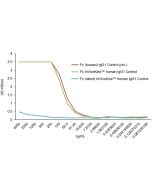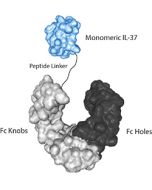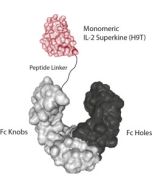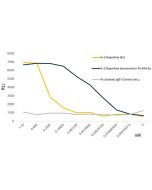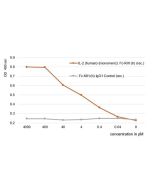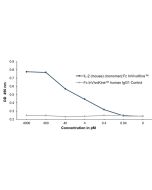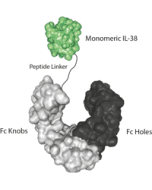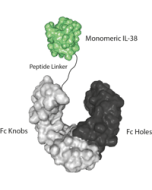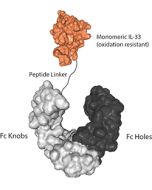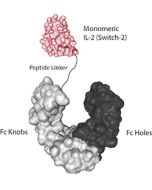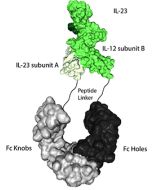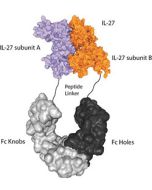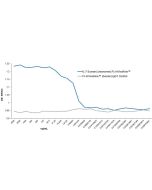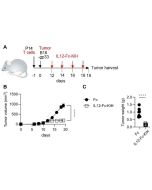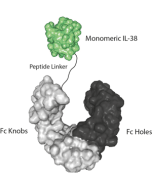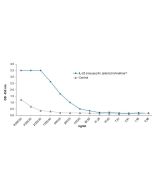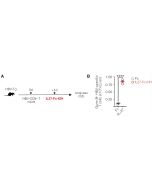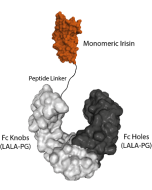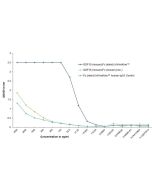Cookie Policy: This site uses cookies to improve your experience. You can find out more about our use of cookies in our Privacy Policy. By continuing to browse this site you agree to our use of cookies.
AdipoGen Life Sciences
IL-21 (mouse) (monomer):Fc (silent) InVivoKine™
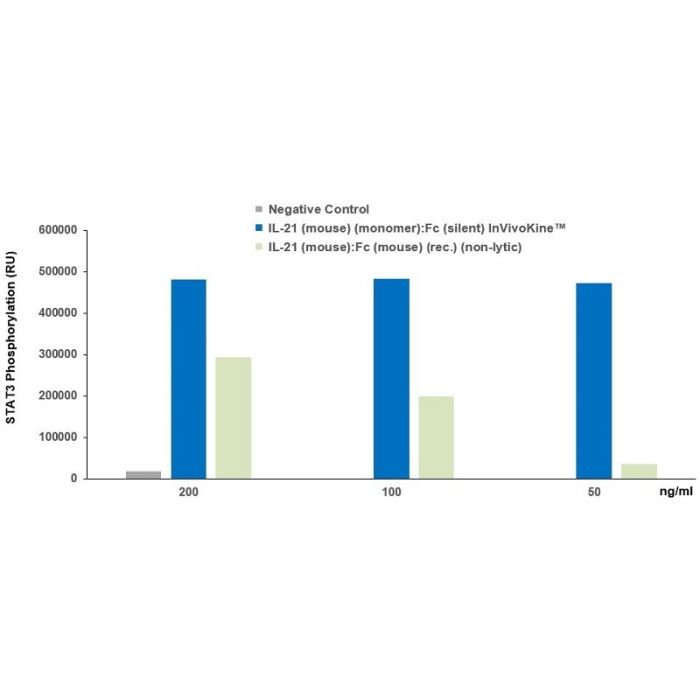
| Product Details | |
|---|---|
| Synonyms | Interleukin-21 (mouse) (monomer):Fc (LALA-PG) KIH (human) (rec.) |
| Product Type | Protein |
| Properties | |
| Source/Host | CHO cells. Produced using animal component-free medium. |
| Sequence |
Mouse IL-21 (aa 18-146) is fused at the C-terminus to the Fc portion of human IgG1 (LALA-PG) (Knobs-into-Holes technology) (see reference: J.B. Ridgway, et al.; Protein Eng. 9, 617 (1996)). |
| Crossreactivity |
Human Mouse |
| Specificity |
The Fc contains the mutations LALA-PG that abolish the interaction between the Fc and FcγRs and therefore Fc undesirable effects. The Fc (LALA-PG) is named Fc (silent). |
| Biological Activity |
Activates STAT3 phosphorylation in human and mouse CD4+ T cells at an ED50 <0.5 ng/ml. |
| MW | ~54kDa and 28kDa (SDS-PAGE) |
| Purity | ≥95% (SDS-PAGE) |
| Endotoxin Content | <0.02EU/μg protein (LAL test). |
| Concentration | After reconstitution: 1mg/ml |
| Reconstitution | Reconstitute with 50μl endotoxin-free water. |
| Accession Number | Q9ES17 |
| Formulation | Lyophilized. Contains PBS. |
| Protein Negative Control |
Fc (silent) InVivoKine™ (human) IgG1 Control (Prod. No. AG-35B-0018) |
| Other Product Data |
Uniprot link Q9ES17: IL-21 (mouse) |
| Shipping and Handling | |
| Shipping | BLUE ICE |
| Short Term Storage | +4°C |
| Long Term Storage | -20°C |
| Handling Advice |
After reconstitution, prepare aliquots and store at -20°C. Avoid freeze/thaw cycles. Centrifuge lyophilized vial before opening and reconstitution. PBS containing at least 0.1% BSA should be used for further dilutions. |
| Use/Stability |
Stable for at least 6 months after receipt when stored at -20°C. Working aliquots are stable for up to 3 months when stored at -20°C. |
| Documents | |
| MSDS |
 Download PDF Download PDF |
| Product Specification Sheet | |
| Datasheet |
 Download PDF Download PDF |
IL-21 is a monomeric 15 kDa cytokine, identified as a multifunctional cytokine principally produced by follicular helper T (Tfh), T helper 17 (Th17) and natural killer (NK) cells, but also by CD8+ T cells. As a receptor for IL-21, IL-21R, a class I cytokine heterodimeric receptor, shares a common cytokine receptor γ chain with other cytokine families, including IL-2, IL-4, IL-7, IL-9 and IL-15. The IL-21 receptor (IL-21R) is heterodimeric (composed of an α and ɣ-chain) and physiologically expressed on immune cells (T and B cells, macrophages, DCs, thymocytes and splenocytes). Upon binding to its receptor, IL-21 induces strong and sustained activation of STAT3, which is critical for its effects on B cell and T cell differentiation. IL-21 produced by follicular helper CD4 T cells (TFH) acts directly on B cells to generate high-affinity, class-switched antibodies. IL-21 is important for the maturation of T and B cells in Germinal Centers (GCs) and supports the formation of antigen-specific memory B cells and long-lived plasma cells. The formation of Th17 cells is promoted by IL-21. IL-21 is an important key factor in chronic inflammatory and in autoantibody-mediated skin diseases, where Th17, Th1, Tfh or B cells are critically involved.
IL-21 is a promising immunotherapeutic agent for cancer. CD8 T cells expressing IL-21R fight cancer and drive autoimmune disease. IL-21 promotes maturation, enhances cytotoxicity, and induces the production of IFN- γ and perforin by NK cells. IL-21 is known to directly induce apoptosis in certain types of lymphoma. Finally, IL-21 is used in adoptive transfer of in vitro expanded tumor antigen-specific CD8 + T cells (TILs cells) and IL-21 induced a long-lived memory phenotype compared to the cells not treated with IL-21.
The IL-21 (mouse) (monomer):Fc (silent) InVivoKine™ is produced by using two different vectors, one encoding for the IL-21 (mouse):Fc (LALA-PG) Knobs sequence (synthesizing a protein of 54kDa) and one encoding for the Fc (LALA-PG) Holes sequence (synthesizing a protein of 28kDa). Both vectors transfected into CHO cells produce both Fc (LALA-PG) molecules (Knobs-into-Holes technology; J.B. Ridgway, et al.; Protein Eng. 9, 617 (1996)) required for dimerization of the Fc moieties and for secretion of the final protein IL-21 (mouse) (monomer):Fc (silent) InVivoKine™. The LALA-PG mutations inhibit binding to FcγRs and C1q while FcRn binding and Fc stability remain unaffected.
InVivoKines™ are a new generation of recombinant fusion proteins for immunotherapeutic, preclinical and translational in vivo research, developed and manufactured by AdipoGen Life Sciences.






